Podcast: Download (Duration: 27:32 — 25.4MB)
Get Notified Of Future Episodes Apple Podcasts | Spotify | Amazon Music | Android | Blubrry | Gaana | TuneIn | Deezer | Anghami | RSS | More
Episode highlights:
01:24 – It starts with passion
03:41 – How it was done
04:59 – Can it work for boring fields?
06:20 – The trust factor
09:21 – How much time does it take?
10:59 – A look at the numbers
12:56 – What setbacks were there?
15:26 – The personal touch and being the boss
17:35 – Handling the criticism
18:20 – The impact of FB Live
20:07 – More helpful tactics
22:19 – Why not a group?
24:43 – What James should have asked
Stay on top of the latest marketing tactics inside JamesSchramko membership
Transcription:
James S.: James Schramko here. Welcome back to SuperFastBusiness.com. This is Episode 649. We’re going to be talking about building a huge Facebook page following. For that, I’ve brought on a guest, James Brinkerhoff. Welcome.
James B.: Hey, James. It’s really nice to be here.
James S.: Yes, we haven’t been in touch for many, many years. Gosh, I don’t know how long it is now. It’s probably six years, when we met, and you’ve recently popped up in my world. You’re a member of SuperFastBusiness membership. And you were just casually introducing yourself to the other members and talking about your somewhat epic results with building out a Facebook page. And I said to you, it really be good to share this information if you’re up to it, because you had built a community of over a million followers. And you said, Yeah, absolutely. And here we are. So that’s what we’re going to be talking about today.
So why don’t we start off by telling us just a little bit about this Facebook community you’ve built?
It starts with passion
James B.: Sure, well, I think it really starts, James, with getting behind something that you’re passionate about, right? When you’re going to build something to this caliber, to this many numbers, it’s got to be something that you that you’re really interested in and you’re going to stick with. I’m constantly looking at the numbers and how people are reacting to the stuff that we’re posting. So I think that’s where it really starts, is kind of getting in touch with that passion, but also, you know, looking at the marketplace that you’re trying to serve, and really understanding where your customers are at, and what their passions are.
“Where are your customers and what are their passions?”
And when I went out to build this, I ended up bringing on a mentor. But I had tried for a few years do some direct response stuff. And I had, you know, some little successes, but it seemed like I was always going out to chase that next promotion. And I had a mentor of mine pull me aside and say, you know, look at what I’m doing over here. And he’s really building up these big communities around a passionate subject, what he calls an irrational passion.
James S.: An irrational passion. Yeah, so that’s, like, golfers?
James B.: Like golfers, yoga, video games. You know, there’s a bunch of them, but anywhere where you see people constantly talking online about this stuff. I would say surfing is probably a good one, right?
James S.: Yeah, I’d have to put my hand up and say yes, that makes sense.
James B.: See, these guys, they travel all over the world chasing waves.
James S.: Yeah.
James B.: And they’re always talking about it. So something like that where it kind of hits that sweet spot.
James S.: Well, you know, every day I go down to the surf, I see a line of vans parked there, people living in their vans. Like, ordinarily, you know, that’s bordering on homeless. Homelessness is, if you’re living out of the back of a van, that could be considered a negative in isolation. However, these people are joyfully passionate about this existence and they just live for it. They travel up and down the coast on a perpetual surf safari, stalking the very best breaks. In fact, I don’t know why they’re at my beach, because it’s generally not the best wave going. However, I see them there and it’s definitely, you know, if you check out my board collection or my fin collection, you’ll see some irrational purchases there.
James B.: Exactly.
Yeah, that’s really a perfect niche for what we’re doing, building these communities and Facebook. And you know, there’s certain niches where people are just fanatic about it like, like vegans or gluten-free, or, you know, all these kind of things. You see people online going crazy over it. So that’s kind of really the first thing, identifying that niche.
And also, you know, hopefully it’s something that you’re passionate about, because it’s going to take more time than just running some paid traffic to a landing page. You’re building a community, you’re building that audience.
How it was done
And so the second thing that we kind of add in there, James, is once I built it to about 60,000 fans, and the way that I built it was with engagement ads. So just, you know, really cheap and easy, like-this-page $5 ads, and I didn’t really spend more than $40 a day doing it. So once they start to like, you know, you put it in front of them and they like it, then, while you post, that algorithm kicks in, and it starts showing your posts to them and, then the more comments and likes, you know, engagement you get from there, you know, it starts kind of hooking them in their newsfeed. But once we got up to about 60,000, then we started publishing articles. So while I was posting maybe seven posts per day, mostly memes, you know, lots of humor and entertainment, then I would interject, like, two blog posts during the day to drive people to my content site.
James S.: Where do you get memes from?
James B.: Well, actually a couple of different places. But you can find them online. You can find them, and then you can kind of customize them. There’s a handful of different apps out there to kind of customize them. But you can grab the images from, I mean, I grab a lot of them from Google Images.
James S.: Right. So it’s interesting that Facebook permits that, because I think they encourage you to upload something that you own the copyright to. A lot of these things are just recycled, and clearly it doesn’t matter that much.
James B.: Yeah, it is interesting. I do try to create fresh custom content, but I don’t always do it. I definitely do recycle some stuff. And I’ll maybe change the branding around.
Can it work for boring fields?
James S.: Just one thing. Just on the step before this, the irrational passion market. I’m interested, can some of the techniques that you’ve used translate through to a less passionate market? Let’s say someone listening to this has an accounting service, or they’ve got a Facebook ads agency, or they sell services to gyms. Like, could you build out a good community in a more boring niche, something you’re not as passionate about, however, it’s very commercial? Because I think one thing that’s going to come up is in some of these markets, whether it’s surfing, or golf or in your market, which we haven’t mentioned, we might find it hard to monetize this. We might get high volume and high interest and big numbers, but it is harder to tap the flywheel and turn that into money, versus some of the more boring dry niches where there’s a full blown service. Can some of these techniques apply to a traditional market?
James B.: Well, James, I think it can. But I would also, you know, I would caution and say, if I was going to do it, like, some of the things you’re talking about, accounting and some of the more dry stuff, I would definitely cross-market. And I would look at, you know, as an accountant, I would look at my clients and say, What are they passionate about? What would interest them? Because we’re on Facebook and it’s not like Google where people go to search and try to solve their problem. You know, people go to Facebook for entertainment and to visit with their friends and family. And so it’s a little bit different to pull people off of that environment to offer your services.
The trust factor
What’s incredible about it, is that you build trust. And then from there, you could almost sell them anything. I’ve got people asking me all different types of you know, where do you buy your blender? Sometimes we do videos, and we do some health stuff, and we’re making smoothies and stuff. They ask me where to buy the blender. They ask me what services I use, or do I start an LLC or an S corp, and that has nothing to do with my niche, but you’re building trust with these people.
“You build trust. And then from there, you could almost sell them anything.”
So what I would do really was, I would really look at my target market and my avatar or my target customer, and kind of try to envision, where would they like to hang out?
James S.: Gotcha. So if you’re going to be selling bookkeeping services or something like that, just, you know, no offense to bookkeepers, and I certainly went through some accounting studies and worked in an accounting firm for a while there, so I’m speaking from experience, it’s not the most thrilling work for everybody. But there are people who get really, really excited about spreadsheets and balancing T accounts and stuff. But so it’s a matter of finding where is that customer hanging out, and what can we create that would be great for them? It kind of reminds me of something Dean Jackson teaches, which is, if you’re selling wedding cakes or wedding event functions or wedding dresses, you could be the person who promotes and publishes a wedding planner. So you get in first at the very start of the funnel, and then you can control the rest of the funnel. So you could think about, what do all of your customers do or have in common? Or where would they all be hanging out, so that you can get into their ear and put your message to them at the right time in the future.
James B.: Exactly, James. It’s exactly the way I think about it. You know, sometimes you see these neat pages where people are posting like their favorite vacation spots, but people who like to travel, they need bookkeepers too, you know?
James S.: You know, in my market of business coaching, travel is definitely something that most people do when they start to cut the umbilical cord from having a job. I certainly did. Soon as I got out of working full-time, I started traveling around the world every year or so. That was a big thing. That’s a good discussion point.
People seem to like non-business activities. Like surfing is a very popular with my audience. I think they all know that I surf, and they celebrate that I do, they want me to have time off and not be a droning workaholic, because that’s what I stand for. It’s one of my values, you know? On a sliding scale, there’s the bone-lazy person who’s never going to achieve anything, through to the workaholic who goes past the point of what they really need, to a diminishing return where they start to erode into health and happiness and family time. So I’m somewhere in the middle there.
And I think it’s good to know what your market resonates with. So if you had a bookkeeping service, applying that filter to some of the things you’re teaching us, I’d find out, what is the customer really passionate about? I imagine as a bookkeeping service, you’re generally dealing with business owners, mostly as your clients, you think about what the business owners like. And lots of business owners probably like prestige cars, travel, fine food. They’re all interested in working less and making more, generally. Like, how do they get more money for the amount of time they’re working? Or, how can they have a bit of time away from the office, because it’s like a constant drag on them, having this responsibility? So they do probably go to Facebook for a bit of light humor and entertainment.
So memes are a strong part of your formula. And you’re doing quite a few of them. Did you find it took a lot of time?
How much time does it take?
James B.: Well, actually, no, I’ve found a couple of apps that you can use. It pretty much automates the entire process. So it takes me about one day to do maybe a month and a half worth of meme posting.
James S.: And do you think they’d be relevant for other markets? Like is it a universal thing? I know, even in our company, in our Slack channel, I’m often posting GIFs and things to make my team laugh. I think most people like to have a laugh during the day.
James B.: Yeah, I mean, it’s the new language online, right? Everybody’s kind of posting GIFs and, you know, people go to Facebook, they want to be entertained, James. The jokes kind of lead into a couple jokes, and then give them something you know, with some sustenance and some meat to it.
James S.: Let’s talk about the meat. What comes after the light-hearted entree?
James B.: Then we get into more of the meat, you know, whether we’re talking about current events, news, or how-to tutorial, or the top three things, kind of all those regular taglines that you hear that make a blog post good. And that starts to build the authority, right? I start pushing all this social traffic to my blog.
James S.: Then when you say pushing the social traffic to your blog, how do you get people from Facebook to your website?
James B.: Well, usually the engagement builds up during the day with those memes. So by the time I hit a blog post, a lot of people start heading there. Also, I have a chatbot connected to the Facebook page. So whenever we publish new content, I’ll just give them a quick message saying, hey, we’ve got a new blog post here, go check it out. Then I can push that social traffic straight to the blog.
James S.: Nice. So you’re basically just creating this viral loop of content, push back, share, content, push back, share, like adding and adding.
A look at the numbers
How big is the page? Or how big did you get it to? And how big is the chatbot subscription?
James B.: Tmain pages is at 985,000 followers. We started about two and a half years ago on this page.
James S.: Wow.
James B.: And now the chatbot is about to cross 400,000 subscribers, and it is just like, I mean, James, it’s turned into a content machine. I can’t turn it off. Like, there’s just so much traffic. And that’s part of what I’m working with you on, is how to segment all this traffic.
James S.: Yeah, we’re going to slice it, dice it and turn it into cash. You know, in a respectable way. And I think it’s great that you’ve sort of pursued the model where you build an audience, and then monetize it. And there’s something to be said for that. If you think about the richest guy on the planet, Bezos, and Amazon being so valuable, he didn’t make a profit for the first seven years, I think it is. Someone can fact check that. However, the point is, it was a long-term monetization process. You know, he built it for the long play.
I mean, I’m all for cash today upfront, to validate a model. We hear about the lean startup, you know, get your offer out there, get paid now. I was cash flow positive from day one in my business. However, I now have business elements, such as my content sites, which is why my radar picked up when you were talking about this, where I’m getting paid along the way, a little bit of revenue from advertising and publishing. My real goal is to sell for a big amount later on when it’s mature and fat on the vine, when I’ve got these big, juicy fruits on the vine that people can come and pluck. So sure, we can do tours of the orchard and sell a little bit here and there, but I want to sell the whole orchard later on. So this is a longer term play for you. You’ve certainly put in the time now, two and a half years, you felt something substantial.
So just a quick recap. You’ve picked a market where there’s a high amount of passion, where you’re interested enough to keep turning up, where you are posting memes, you’re doing current events, news, you’ve hooked up a chatbot, you’re reengaging people. Then you’ve topped it up with some ads, to just keep it ticking along.
What setbacks were there?
What sort of setbacks have you experienced along the way? Have you ever felt that you were skating on thin ice with having all of these eggs on Facebook’s basket?
“Do not put all your eggs in Zuckerberg’s basket.”
James B.: Oh, yeah, James, I mean, honestly, to all the people out there that might be listening to this, do not put all your eggs in Zuckerberg’s basket. And, you know, I think it was just yesterday or the day before, a big chunk of Facebook went down. And I watched all these people, like, pulling their hair out. And literally, people were having anxiety attacks over the Facebook ad manager. And it was funny because I’ve just been taking a lot of your content, Own the Racecourse, and some of the traffic stuff that you have in the membership. And looking at the chocolate wheel, right? With all these different traffic sources coming in.
James S.: Yes.
James B.: And so yeah, I’m doing everything I can every day to push that traffic off of Facebook and get email addresses and even physical addresses, as much data as I can, onto my own server.
James S.: It’s so good to be able to reach out to someone. I would say this, if Facebook vanished off the face of the earth, it wouldn’t really impact my business. I think we have around 10,000 fans, I’m not sure what you call it, subscribers, on our page. I’ve got 5000 people following my personal account. And that’s great, but I’m finding I’m using it a little less often. And they’re definitely getting a lot of hate for privacy.
And I could do just fine without Facebook, because there are other platforms out there to build out strong. For example, your own website. A good chunk of my traffic comes from my own website. Good old-fashioned boring SEO. Thank you, Google. Direct response people typing in SuperFastBusiness into Google to find my site. That means the branding is strong.
“The community starts to represent something stronger than just a brand.”
So I think you covered this, too. You really wanted to build a strong community. And the community starts to represent something stronger than just a brand, in the same way that I think the community at SuperFastBusiness, it goes beyond just a logo and a cool name. It’s like the people there.
And I’m really sort of reminded of that, at this time of the year when we come into our live event in a couple of weeks from now. People will be flying in from all around the world to SuperFastBusiness Live. And at the time this recording is published, it would have been run. However, you know, it just strikes me that this is the 10th year that we’ve run this event and the camaraderie and the community spirit of the members is so powerful. And that sort of transcends just the brand.
And you found that with your community, they help indoctrinate new people, and they come on board, and it’s got its very own sort of culture or takes on its own life. Is it something you found with your Facebook page?
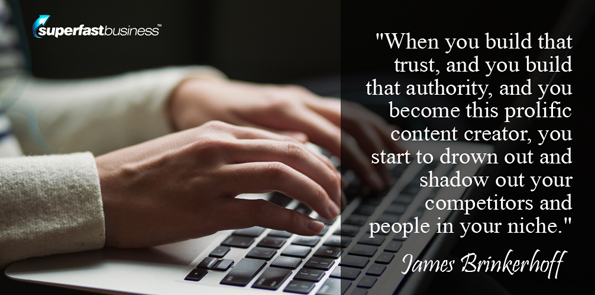 The personal touch and being the boss
The personal touch and being the boss
James B.: Exactly, exactly, James. I mean, you really hit the nail on the head. And the same thing that you’re talking about in your business, that’s what I believe – creates longevity. And when you build that trust, and you build that authority, and you become this prolific content creator, you start to drown out and shadow out your competitors and people in your niche. And also, you know, when you have that personal touch, I think you had a podcast recently about this, but that personal touch in your business, where you actually talk to your clients and your customers… You know, I’ve paid probably $10,000 for a day of business coaching before, and then you never hear from the person. I’ve known you for like, six years. And just being back in your community again, you really see the personal touch that you put on your business and your members and the trust and respect that they have for you. So at that point, James, I think it doesn’t really matter if you’re selling business coaching or surfboards, they’re going to trust you to whatever direction you lead them. That’s also a big responsibility, right? I’m sure you have a lot of stories about that.
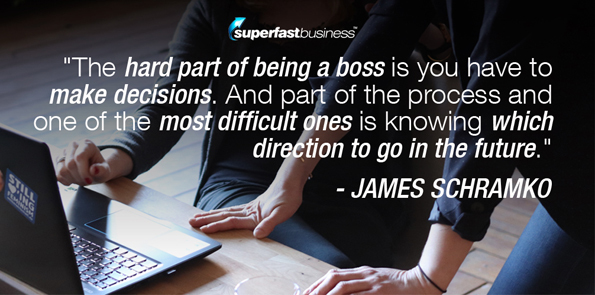 James S.: It’s a huge responsibility. And the hard part of being a boss is you have to make decisions. And part of the process and one of the most difficult ones is knowing which direction to go in the future. Because right now, as you sit, you’ve got near on a million followers and 400,000 subscribers to your chatbot. You know, where you go next will make a big impact in your life and the life of your community.
James S.: It’s a huge responsibility. And the hard part of being a boss is you have to make decisions. And part of the process and one of the most difficult ones is knowing which direction to go in the future. Because right now, as you sit, you’ve got near on a million followers and 400,000 subscribers to your chatbot. You know, where you go next will make a big impact in your life and the life of your community.
“You can’t just do everything everyone wants, because a community led by committee will end up being a disaster.”
I’ve just put out a survey to my members asking them what one thing would they change about my membership. And even though it’s going to be really hard to do, I’m going to read through every single response and just grit my teeth and take whatever ideas and suggestions come forward. And then at the end of that, decide how can I improve, refine and innovate my community to be the best it can be for my members. Thankfully, I’m getting lots of nothings, it’s perfect, but there are some really good suggestions coming through. So part of it is being confident as the business owner on the direction that you know best for your community. And then the other part is being open minded to how you can best serve them. And there’s a fine balance. I mean, you can’t just do everything everyone wants, because a community led by committee will end up being a disaster. Someone has to take the reins, and for now, that’s you.
Handling the criticism
So how much weight do you put into any kind of critical comments or feedback from members? Because I’m sure some of them would rather have this or that and you have to make decisions along the way, and I’m sure you also have to do some kind of moderation from time to time. Do you get scenarios that need pruning?
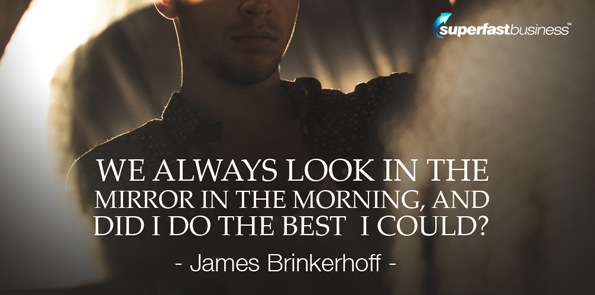 James B.: Oh, yeah, of course. It keeps us on our toes, James. And it’s always, you know, we always look in the mirror in the morning, and did I do the best I could? Those kind of scenarios, is where I see myself. When you have a million followers, you get all kinds of people, you know? So I got people that call me out and call us bad names and say inappropriate things about my wife and all that kind of stuff. So you have to kind of have a thick skin. But I do listen, and I do watch, and I do really try to listen to them for the most part, and do the very best that I can.
James B.: Oh, yeah, of course. It keeps us on our toes, James. And it’s always, you know, we always look in the mirror in the morning, and did I do the best I could? Those kind of scenarios, is where I see myself. When you have a million followers, you get all kinds of people, you know? So I got people that call me out and call us bad names and say inappropriate things about my wife and all that kind of stuff. So you have to kind of have a thick skin. But I do listen, and I do watch, and I do really try to listen to them for the most part, and do the very best that I can.
The impact of FB Live
James S.: Yeah. Nice. I wanted to talk about Lives because that’s probably something Facebook does particularly well. And they encourage this. This seems to be something they want, is video content and live video content in particular. Were you using that and how often?
James B.: Yeah, so like I said, after I got it up to about 60,000, I started publishing the blog post. And then when it hit about 100,000, I was seeing the engagement from the blog posts and I kind of turned to my wife, who happens to be a public speaker and does very well on video, and I said, Hey, why don’t you try to do a Live in here? And so, you know, she went live, and it just exploded after that. You know, that really is a game changer when Facebook put that out there. People want to connect with other people. And when you go live, they put you at the top of the newsfeed.
So that was really powerful. When we started doing that, about six months into building the page, like I said, when it got up to about 100,000 likes from the like campaigns that we were running, then she went live and we started running two lives a week, Tuesdays and Thursdays. And we kind of took it from, like, a podcast style into a show. And so we just started running this show on Tuesdays and Thursdays. And that really took off. I mean, some of these shows get 60,000 views. We were up to, when the page was really engaged, and if you’re on Facebook long enough, you start to understand that Facebook kind of has these rising tides and these falling tides. Sometimes they give you tons of engagement, sometimes they take it all away. But during some of those higher tides, we were getting 1500 people to stay on for an hour and listen to the live broadcast. So the live video really pumped it up. And then when I do a live video, I’ll take the URL from the live and I’ll push it to the chatbot. So I’ll get, I’ll push 50,000 clicks in 10 hours straight to the live video. Then that starts to create this viral engine.
James S.: Right. It seems like when they give it to you, and then take it away, it’s almost like they’re teasing you. They might want you to buy some of that to get it back to where you had it.
James B.: Yeah.
More helpful tactics
James S.: Right. So what other things – we’ve talked about the content, we’ve talked about the live – do you do other, any kind of challenges or giveaways or other sort of tactical things that might be useful for someone who has a page and wants to stimulate it?
James B.: Sure. There’s an app called LiveReacting. And it allows you to run a live video with their templates that they have. And they have these different templates, like running contests, or leave a comment below. And then so you run that as a live video, it pushes you to the top of the news feed, and then you’ll have people voting yes or no. And then as soon as they leave a comment, then you can connect your chat bot to send them a chatbot message. So I’ve used giveaways, I’ve used quizzes, a bunch of different little things like that, with that tool called LiveReacting. And it lets you publish live videos as kind of like a poll or a game. And then you get crazy engagement on your comments. And you can follow up with the messenger bot, multiple things you can do there. Definitely, contests, giveaways, all that kind of good marketing stuff works great on Facebook Live.
James S.: And how much time would you be spending on this Facebook page in a weekly basis?
James B.: How much time do I spend on it?
James S.: Yeah. And when we say you, or do you pay other people to do things? You have forum moderators? Like, is it a team involving in this, or can you do this by yourself?
James B.: Yeah, I would definitely hire someone to do the moderating. And then the bigger it gets, the more help you’re going to need. But in the beginning, it’s not that much, really, if you understand Facebook ads and you can run like campaigns where you hire someone to run, you know, $40 a day, 10 different ads, 10 different $5 ads.
So you have somebody set up your like campaigns. And then the posting, I use an app called Postradamus, postradam.us. And that can aggregate content and you can set up your posting for you know, you can schedule it way in advance. So it just depends on if you want to hire a social media manager to get that set up and do your posting every 60 days.
So once the posting’s all going, then mainly we’re just taking maybe the Monday, we’ll get our content together for the Tuesday and Thursday show, and figure out if we’re going to try to sell affiliate products or what the offer might be. So mainly just, you know, we’ll spend half a day figuring out the content for Tuesday and Thursday. And then we’ll publish an hour of content, the live video Tuesday and Thursday. And then after that, we’ll spend some time kind of on the follow up, answering emails and questions and kind of directing the traffic from there.
Why not a group?
James S.: Okay, so that’s really interesting. I did want to ask you, why a page and not a group with this? Because I had Harlan Kilstein talking about blowing up his Facebook group in Episode 578. But it was interesting to me that you’ve chosen a page. And I’m wondering if you’ve tried the two, or you have some thoughts on the differences?
James B.: Yeah, I opened up a group, James, about a year ago. And I just offered this group to my page and I built it to about 55,000 people in the group, with just like, one promotion. They started inviting everybody to the group, and it gets, it’s kind of out of control. But the page, James, you can run ads to. The groups, you can’t run ads to.
James S.: Right.
James B.: So building the page, that’s kind of the intent on building that page, you know? Groups, not everybody can see.
James S.: So higher visibility and more ability for you to access it as the advertiser.
James B.: Yeah, because you can’t run ads to a group, as far as I can tell.
James S.: Yeah, that’s really interesting.
James B.: James, as far as groups go, I don’t really see much difference. Because I started, I’ll post about the page in the group. And I don’t really see, even with 50,000, you know, my group is so big now that I don’t even have to go in there. And the users post all the content they want to post in there. I don’t even need to post anymore. But I don’t see a higher engagement in the group than I see on the page. I think maybe some group owners do see that, but I don’t really see that.
James S.: That’s really, really good. I mean, this is great. It’s encouraging to us, because I’m running a page and I would definitely ask my team to listen to this podcast and see what we can learn. Because we’ve been posting our podcasts there. We’ve been posting videos, we’ve been posting news. I don’t think we’ve posted any memes, it’s something we haven’t tried. We’ve definitely not done challenges or contests. And I don’t do Facebook Lives, haven’t really got into that. I suspect that would make a big difference, especially because I do quite a lot of video content. For some reason I’ve resisted it. I could definitely experiment with it. I’m open to trying it. But also, I haven’t really built my home on Facebook, it’s just an outpost.
You know, I was wondering, because I didn’t want to start a group, because it really would compete with what I’ve got there with SuperFastBusiness membership. And I didn’t want to create confusion. I suspect if I put myself on Facebook in a group, then there’d be a very blurred line between access to me, and it could actually cannibalize my business, and depower it to some extent. But the page, I think that’s really useful. And I guess in your case, the whole name of the game is to build something that can migrate customers to your monetization vehicle. I’m looking forward to having several discussions around that inside SuperFastBusiness.
What James should have asked
So is there anything I should have asked you that I haven’t that would be really insightful for someone trying to tune up their Facebook page?
James B.: Yeah, I think one thing that I didn’t mention is, I see communities being a lot more powerful than I see brands. From where I’m coming from, I see people building big communities over something of passion. So I would suggest them, find out that thing that your customers are passionate about. Don’t shove your brand down their throat. Build a big community and then offer your solution as a business. So like for yourself, James, I might really take a look at your customer and build a community page around that. Maybe it’s entrepreneurship; maybe it’s the traveling entrepreneur; maybe it’s the beach life entrepreneur. Something like that, where everyone’s really passionate about seeing these cool, what you get to do with the result of your product. And then from there, you can cross market them and take them to your brand page and your brand.
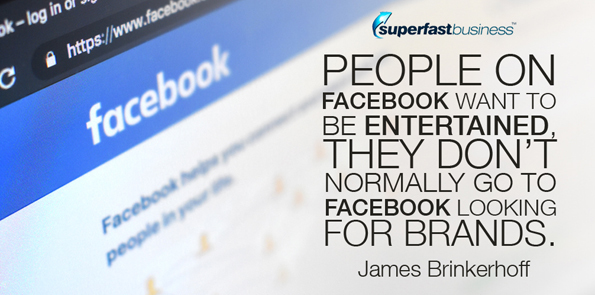 People on Facebook want to be entertained, they don’t normally go to Facebook looking for brands. So I think that’s another kind of like quick tip I would add. And I would also say, you know, video is very powerful on Facebook. So even if you just created a 10, 15, 20-minute video that kind of goes over who you are and what you do for people and how you help people, and you put $5 a day behind that video, you know, after 30, 60 days, that video starts to create momentum and power. And the copy that you write on the long-form post and in the video, how you go through the video, that can really impact your business just by having a $5 a day ad going on Facebook. And then of course, once you’re able to see the people that watch your video, and then you can go retarget those people for much cheaper. So I think those are the couple of things, James, I wanted to add there.
People on Facebook want to be entertained, they don’t normally go to Facebook looking for brands. So I think that’s another kind of like quick tip I would add. And I would also say, you know, video is very powerful on Facebook. So even if you just created a 10, 15, 20-minute video that kind of goes over who you are and what you do for people and how you help people, and you put $5 a day behind that video, you know, after 30, 60 days, that video starts to create momentum and power. And the copy that you write on the long-form post and in the video, how you go through the video, that can really impact your business just by having a $5 a day ad going on Facebook. And then of course, once you’re able to see the people that watch your video, and then you can go retarget those people for much cheaper. So I think those are the couple of things, James, I wanted to add there.
James S.: That’s really, really good advice. We certainly found, from advertising to our existing audience, we got a really high return on investment. I think for every $5,000 we spent, we made over $100,000 in sales. So I mean, it just shows how much stock value is being built up there, with people who are viewing the videos. I noticed the same people keep sharing the news stories that we post in our page, which my team curate from all around the web and find things that are particularly useful for our customers.
So I really appreciate this. It’s so kind of you to come on and share your Facebook page secrets. I know you’ve been generous with it. We haven’t talked much about your market, but that wasn’t the point. We don’t want to blow the lid open on that one. Keep something for yourself. But you’ve shared so much generously. If someone’s listening to this, they want to reach out to you, James Brinkerhoff, is there somewhere you’d like them to go and visit you?
James B.: You could go to SojayMedia.com. I guess that’s our media site that we have up right now. I’m just building a new content site. SojayMedia.com, you’d be able to get a hold of me through that.
James S.: Perfect. Thank you so much for sharing, and I look forward to having many conversations in the future.
James B.: You bet, James.
Learn winning business strategies from the experts inside JamesSchramko membership
Enjoyed the show? Leave us a review on iTunes
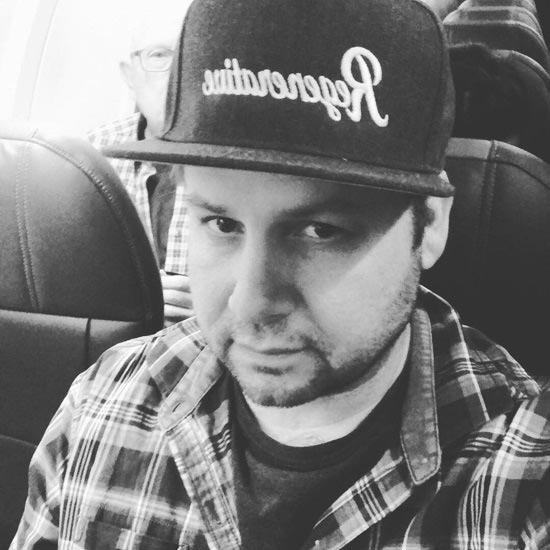
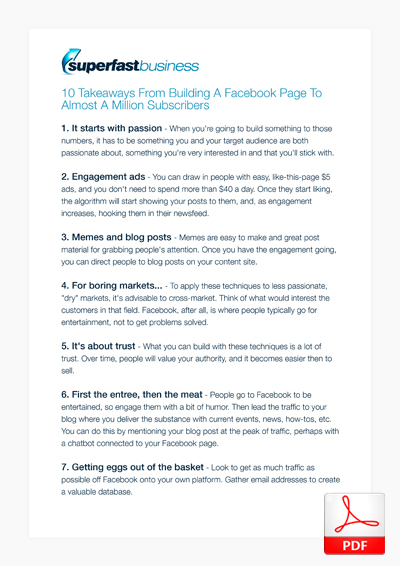









Leave a Reply